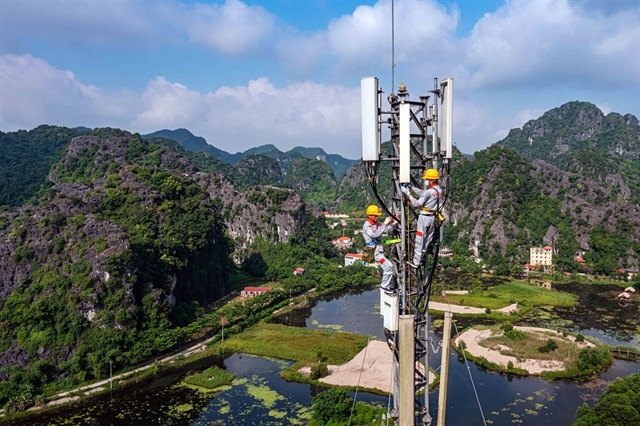 |
| Viettel has already initiated research into manufacturing of 6G equipment while actively participating in 6G patent activities. Photo courtesy of Viettel |
This includes the transition from conventional communications infrastructure to advanced digital economy infrastructure and from conventional information technology to cutting-edge digital technology.
In an official dispatch addressed to various units to mark World Telecommunications Day on May 17, Deputy Minister of Information and Communications (MIC) Phan Tâm highlighted the theme for the 2024 celebration as 'digital creativity for sustainable development.' The International Telecommunications Union (ITU) urged member countries to undertake initiatives that promote technological innovation, offering applications, connectivity and digital transformation.
Telecoms technology, as well as ICT, could play a crucial role in addressing pressing global challenges such as climate change, hunger eradication and bridging the digital divide. These advancements contribute to the attainment of the sustainable development goals established by the United Nations and its member countries by 2030.
Tâm called upon agencies to raise awareness among individuals and businesses about the pivotal role of ICT and digital technology in the industry's development strategy.
According to Nguyễn Mạnh Hùng, Minister of Information and Communications, in 2024, significant transitions are anticipated from IT applications to digital technology; automation to artificial intelligence; processing finite information to leveraging infinite digital data to generate new value; individual software to digital platforms; processing and assembly in manufacturing Make in Vietnam products. These trends serve as both a direction and a driving force for network operators.
From a global standpoint, revenue generated by digital applications accounts for more than 50 per cent of total telecoms revenue and contributes to an annual network growth rate of approximately 10 per cent. While new investments in 5G technology directly create 10 per cent growth, it is important to recognise that this growth extends beyond 5G alone; it encompasses the entire 5G ecosystem.
Encouraging network operators to venture into various industries to create digital applications, drive digital transformation and foster the development of the digital economy is also a vital aspect of the country's industrialisation and modernisation process. Embracing digital transformation and implementing digital applications within these industries serve as effective means to enhance labour productivity.
To realise this goal, the Ministry of Information and Communications has awarded licences to establish networks and provide terrestrial mobile information services using 5G technology to telecommunications carriers.
The director of the ministry’s Department of Telecommunications, Nguyễn Thành Phúc, said: “With the successful auction of the right to use the radio frequency mentioned above, the MIC has officially licensed to establish a network and provide terrestrial mobile communication service using 5G technology from April 11, 2024. Businesses will quickly deploy 5G nationwide in 2024, forming a new infrastructure to promote the development of digital economy - digital society - digital government in Việt Nam.”
The ministry also announced that Việt Nam would deploy 6G technology, positioning the country among the first ten nations worldwide to establish a dedicated 6G Steering Committee. Việt Nam aims to stay at the forefront of 6G technology developments, aligning itself with global leaders in this field. While the 6G network is still at the research and development stage, it is expected to be officially unveiled by 2028 or 2030 at the latest.
Experts believe that 5G networks have already demonstrated their potential to be used in areas such as autonomous vehicles, drones and smart cities. These technologies are expected to advance further with the integration of 6G capabilities. While the 5G network focuses on building a user-centric information ecosystem, the focus of the 6G network will be on unlocking the potential of future technologies.
Viettel has already initiated research into the manufacture of 6G equipment while actively participating in 6G patent activities. In contrast, VNPT will concentrate on researching the 6G ecosystem. MobiFone representatives have also confirmed their involvement in 6G research groups.
According to Phạm Đức Long, Deputy Minister of Information and Communications, there are five global manufacturers of 5G equipment currently and several major world powers have initiated research into 6G technology.
Việt Nam has set a clear goal of actively participating alongside the global community in the development of 6G, including with research, joint production and simultaneous rollout.
Long said: "Việt Nam is committed to global 6G standards. The MIC in collaboration with businesses, is actively engaged in research and driving the advancement of this technology. The government will invest in laboratories to support businesses in their research and production of 6G equipment. Opportunities exist for all nations, but success will be attained by those who seize them. By laying the foundation today, we aim for success in the next decade. Without taking action now, we risk having nothing in ten years' time. Researching and producing 6G equipment will pave the way for a new industry in our country." — VNS